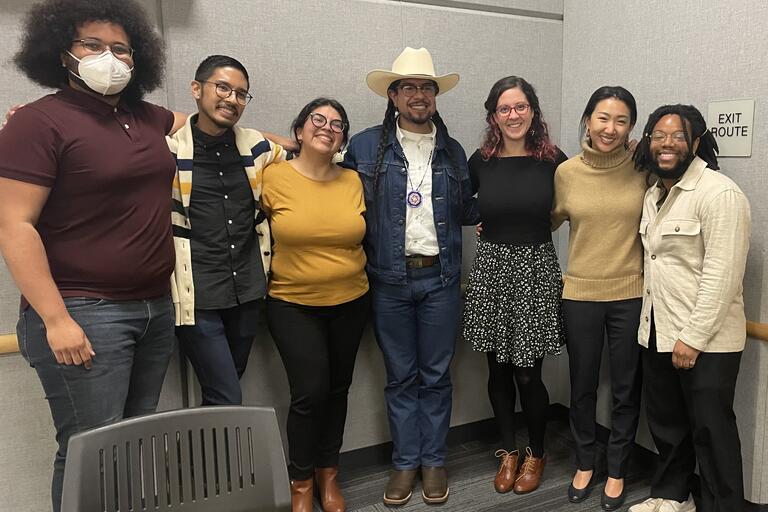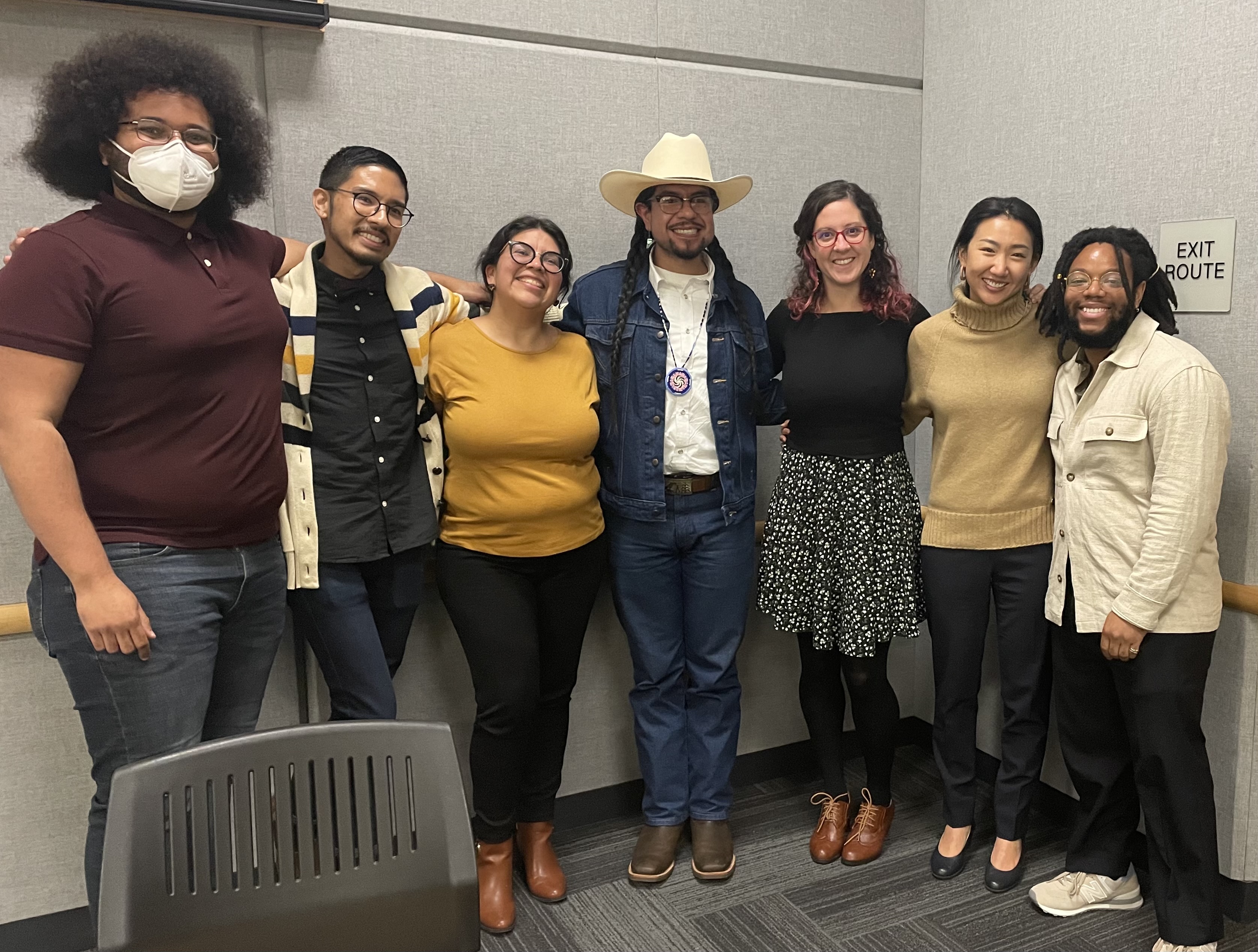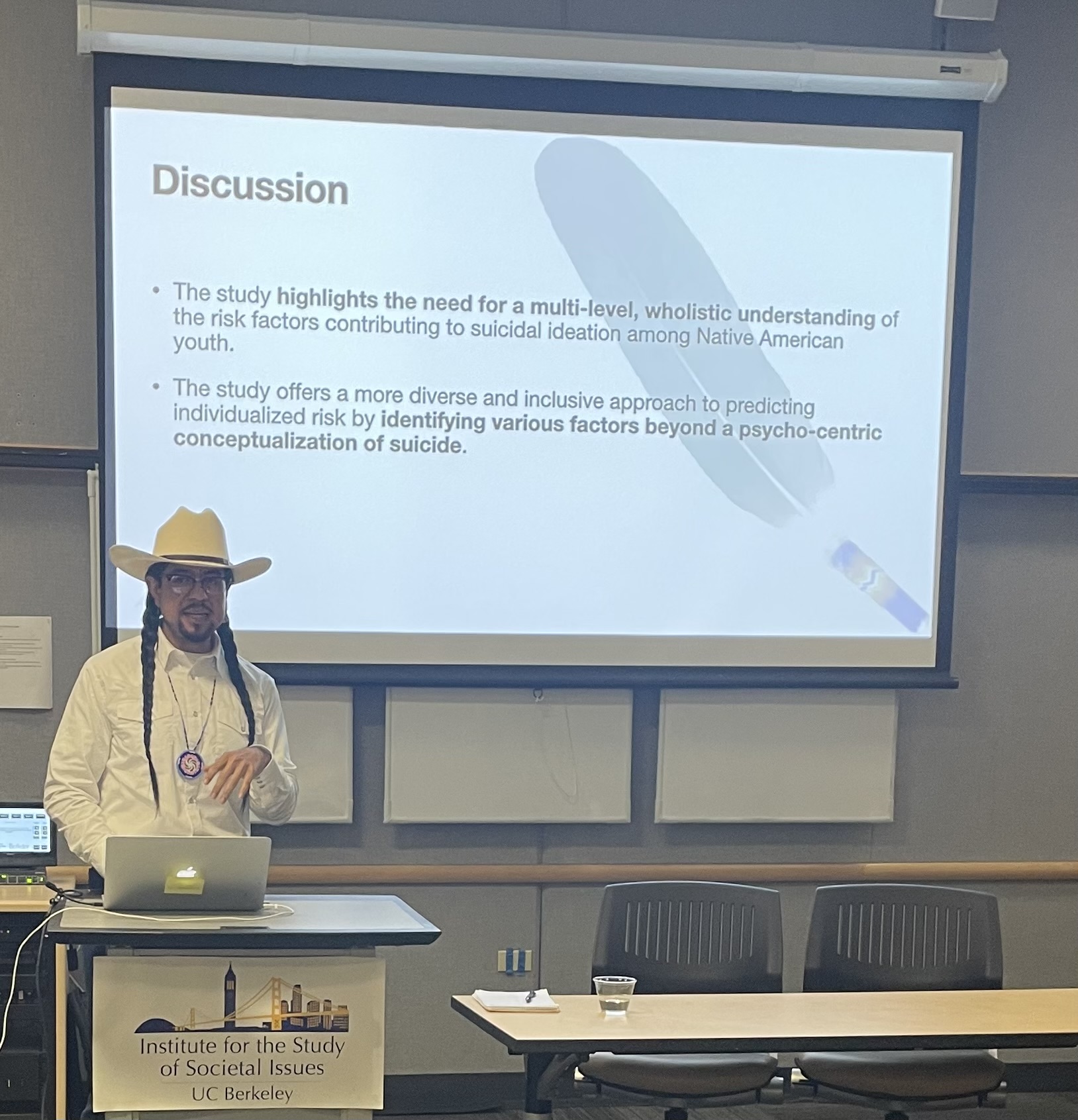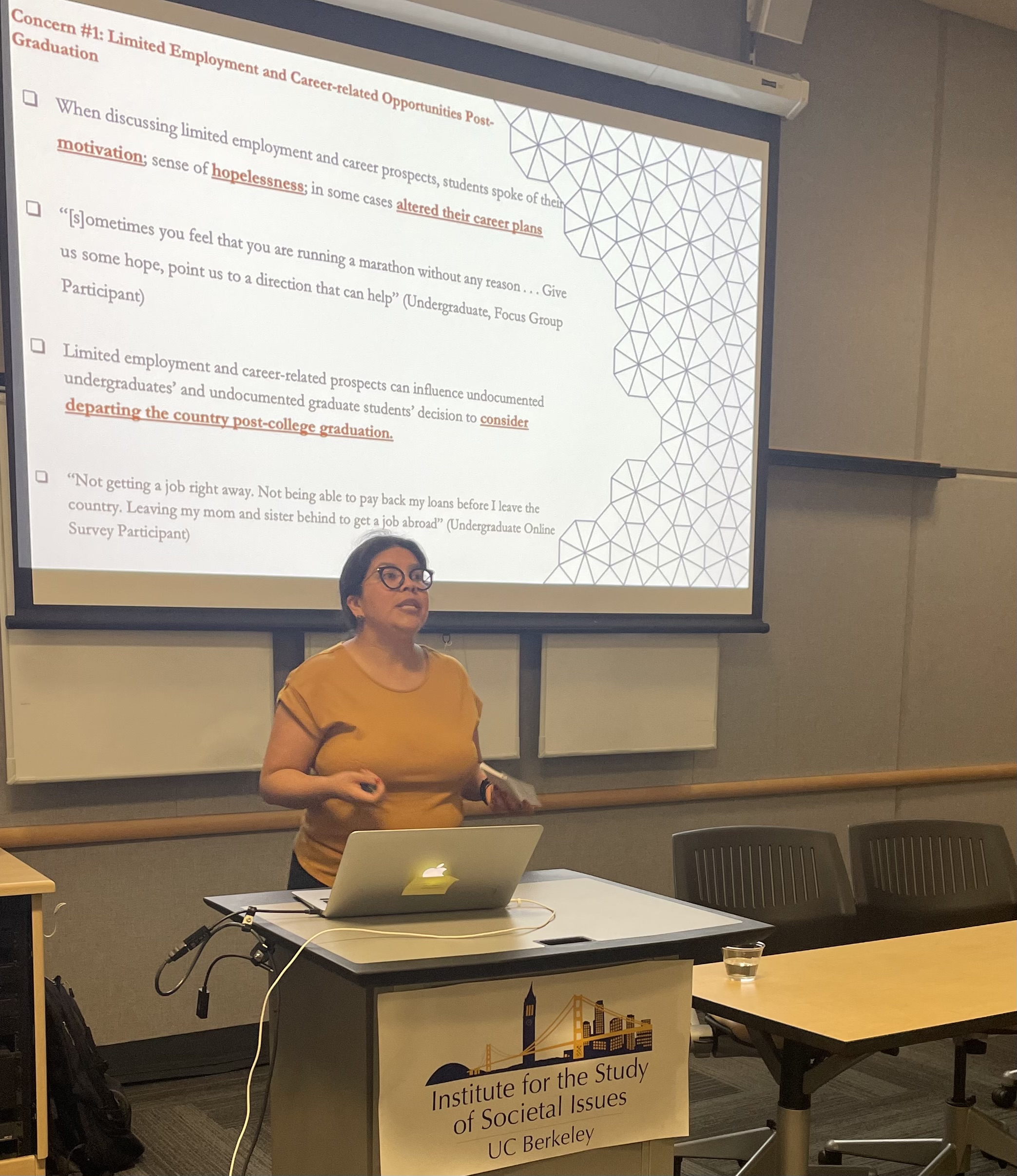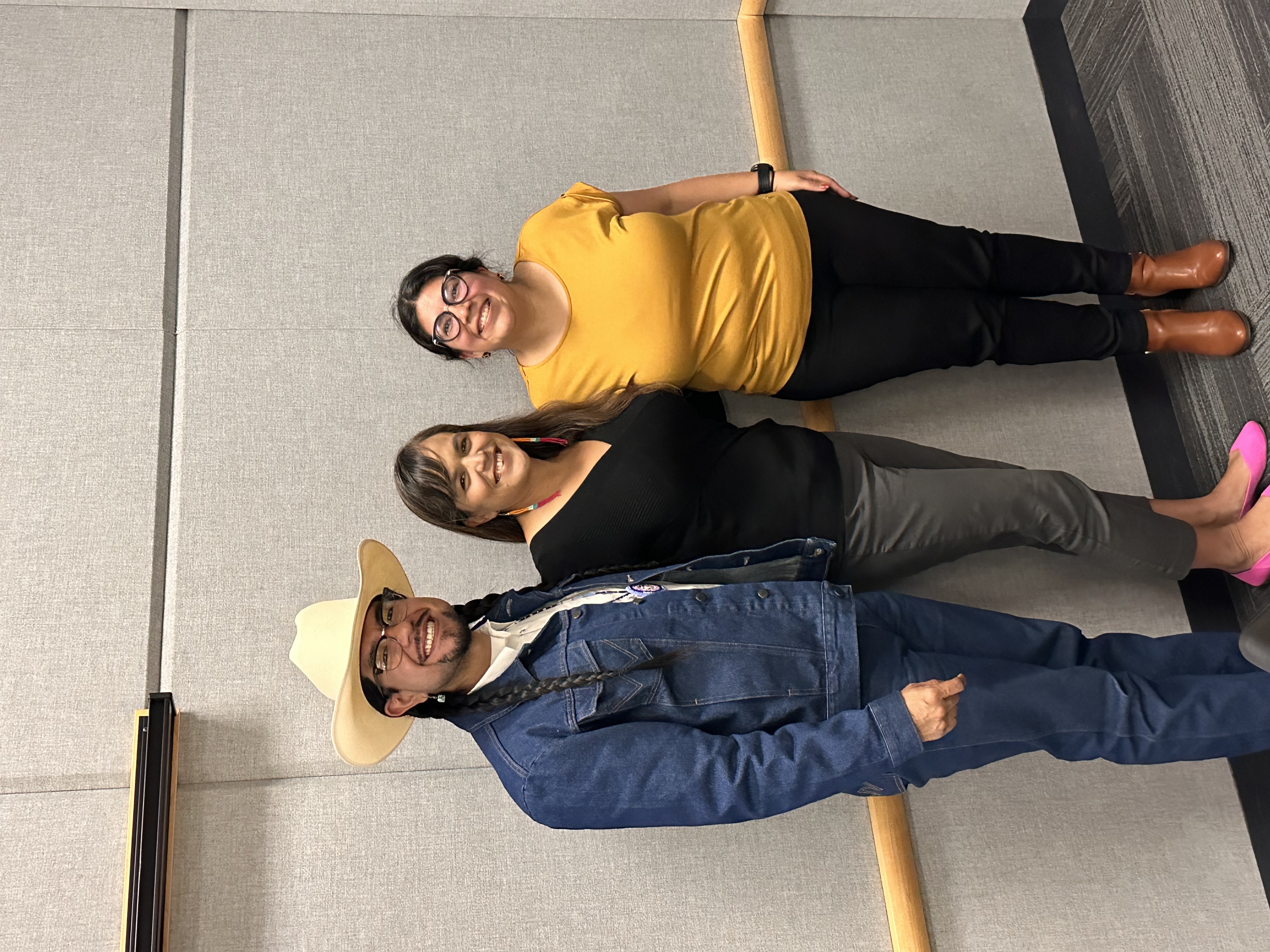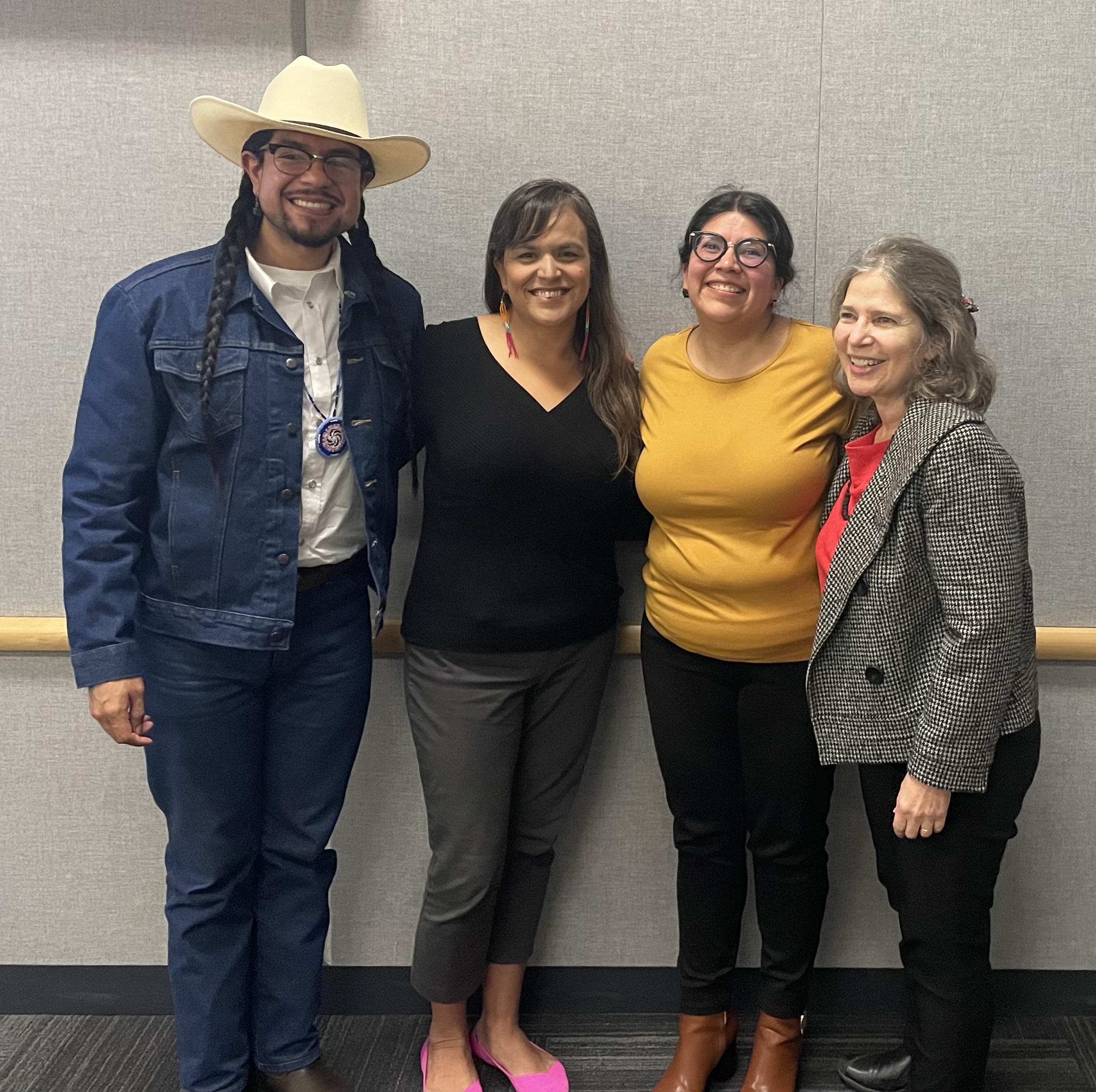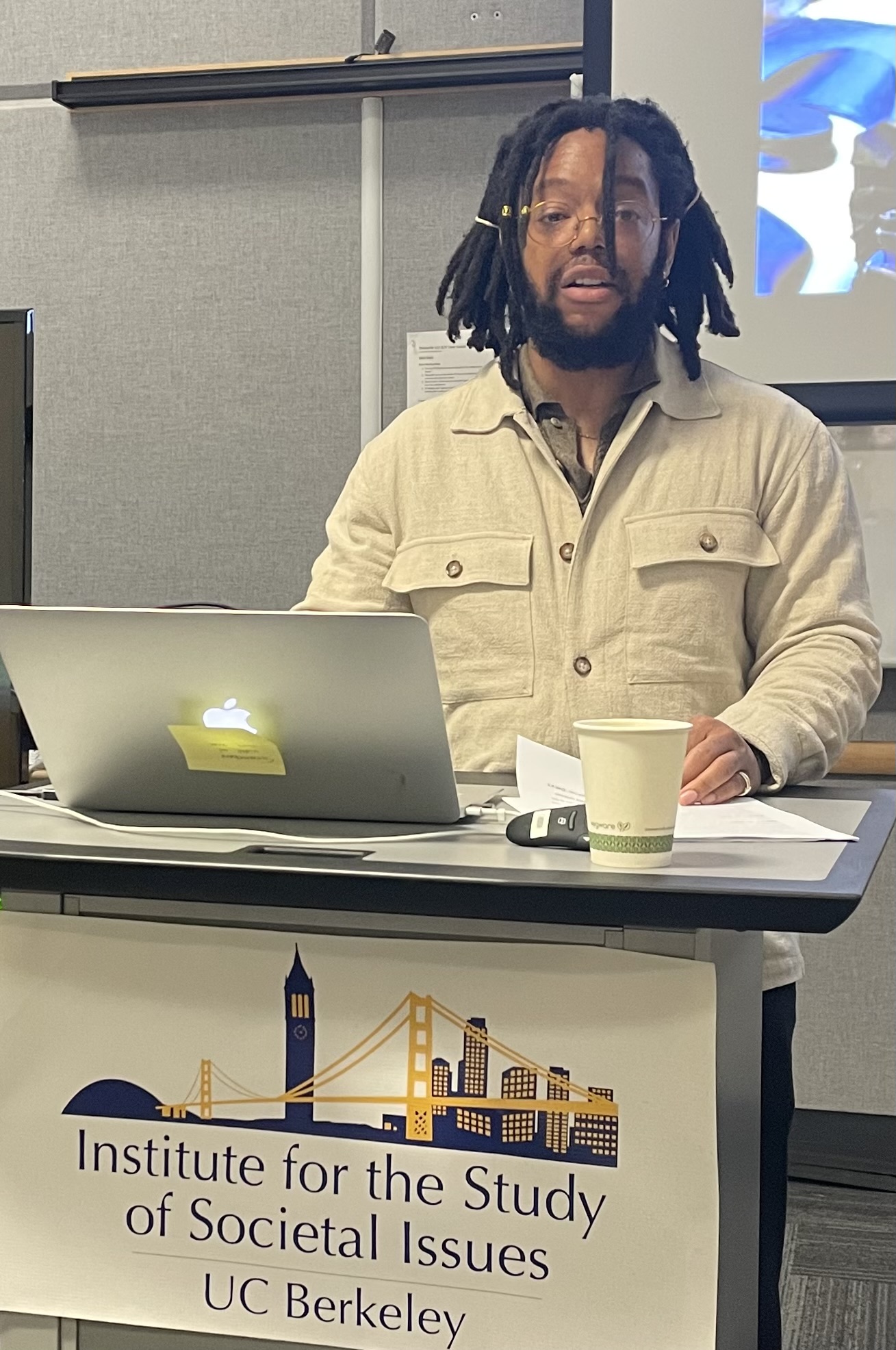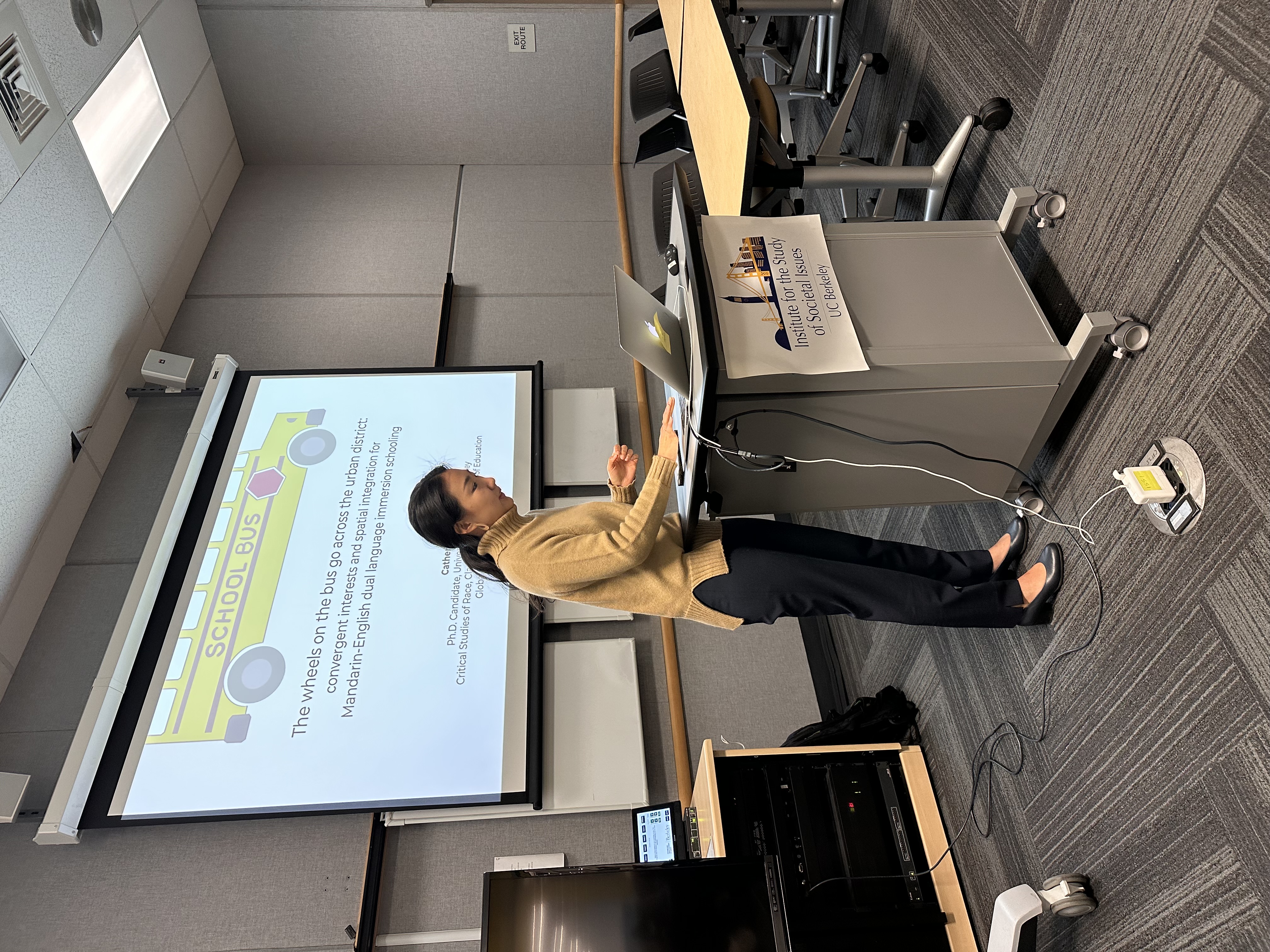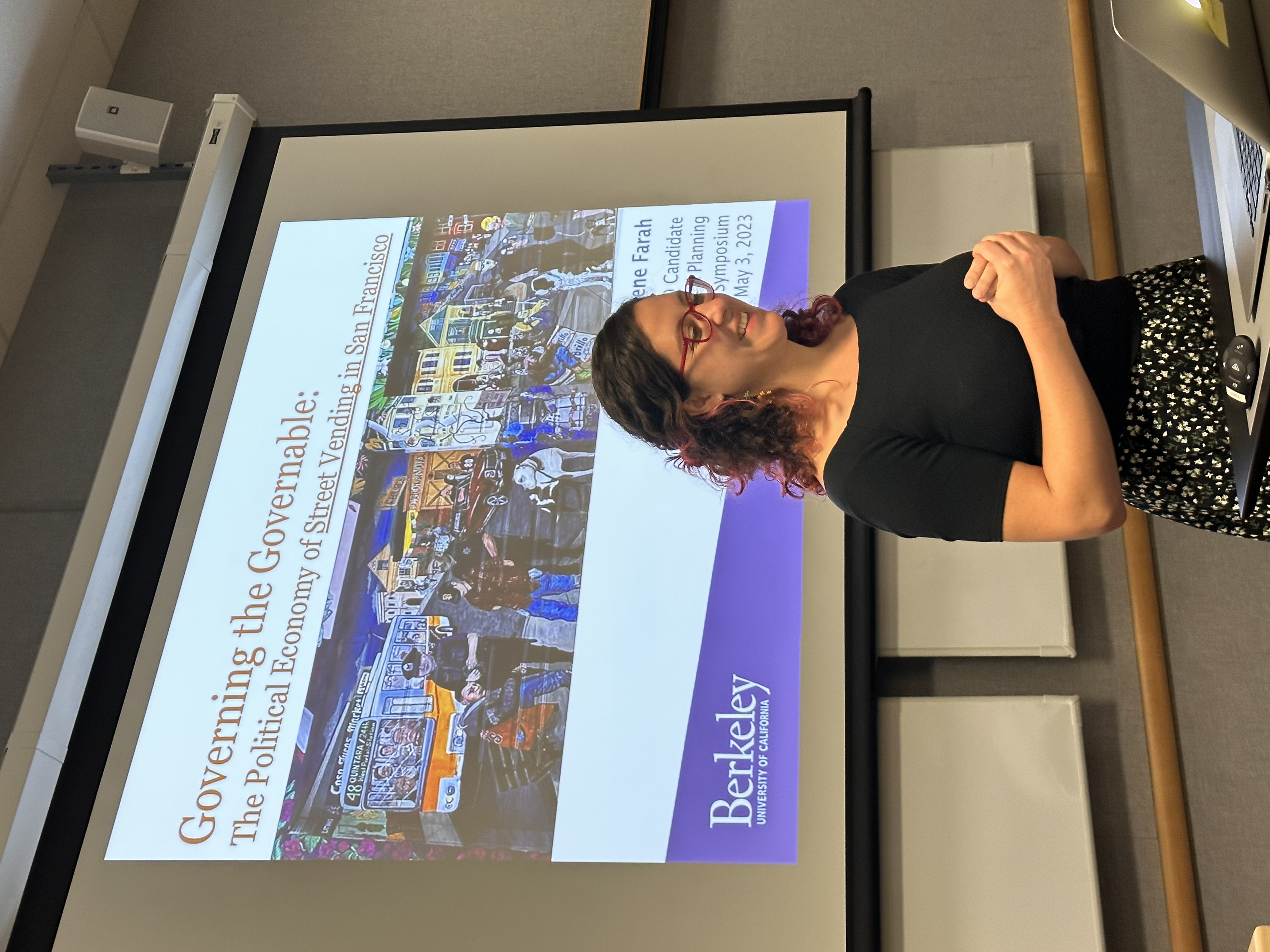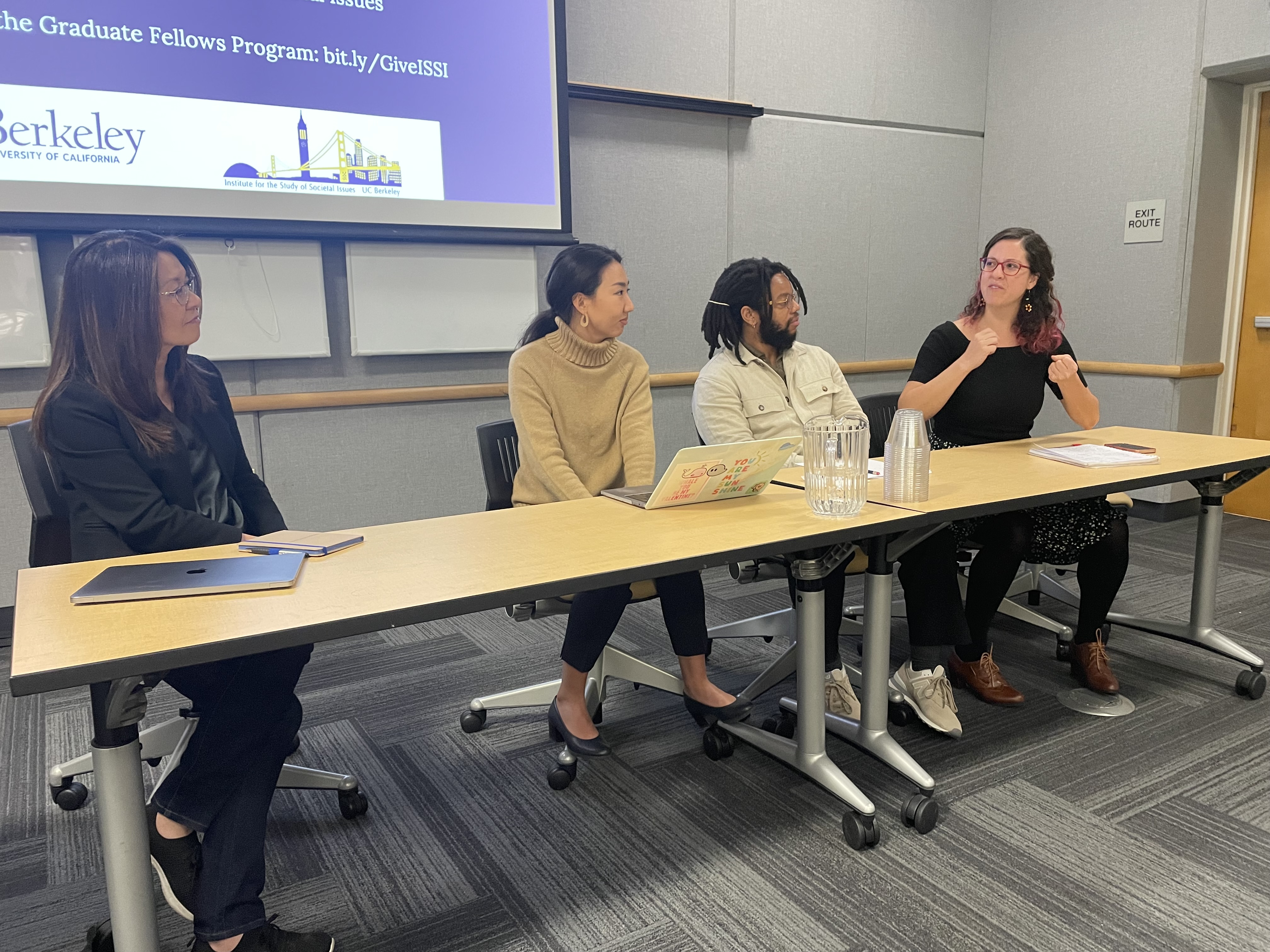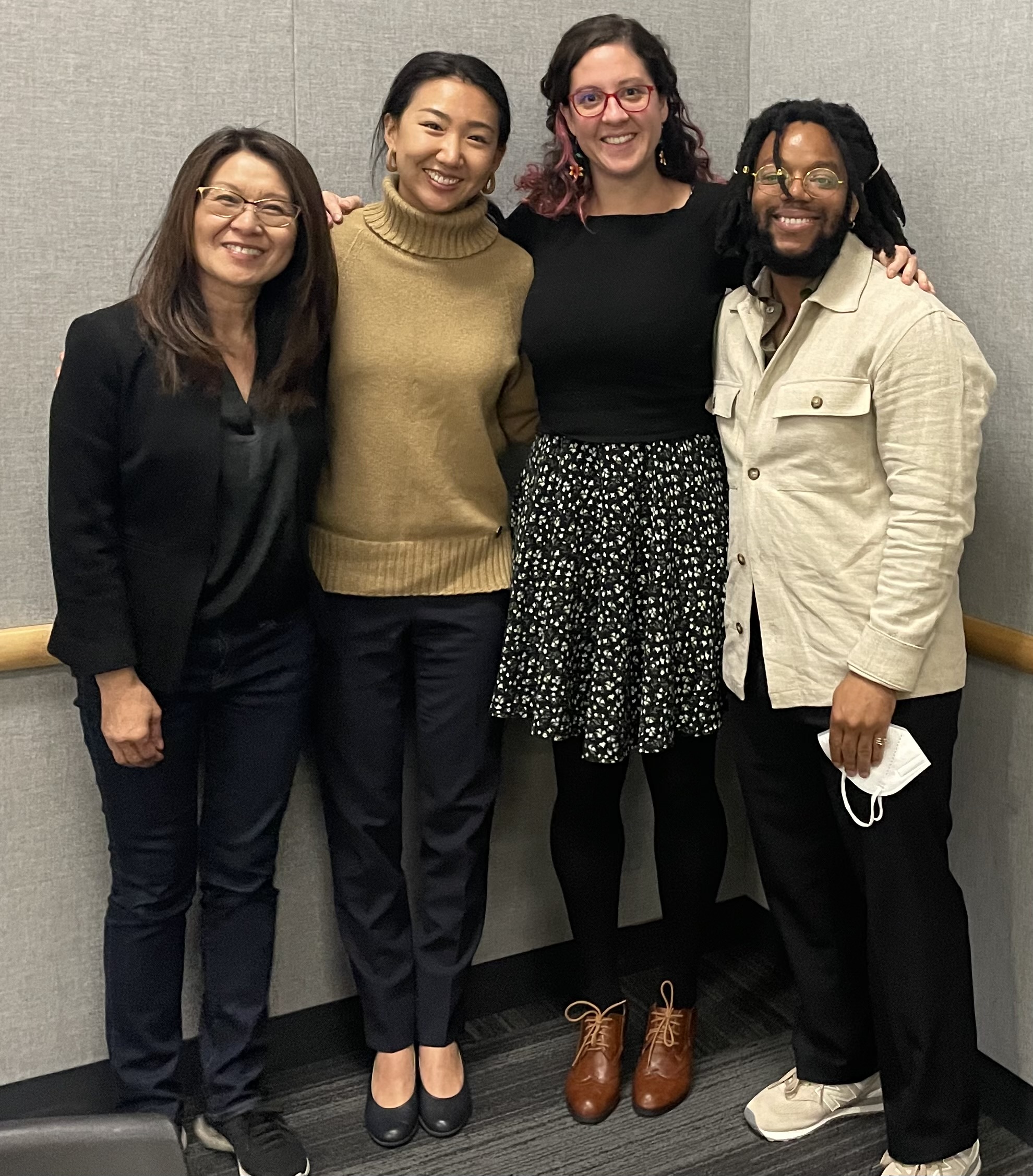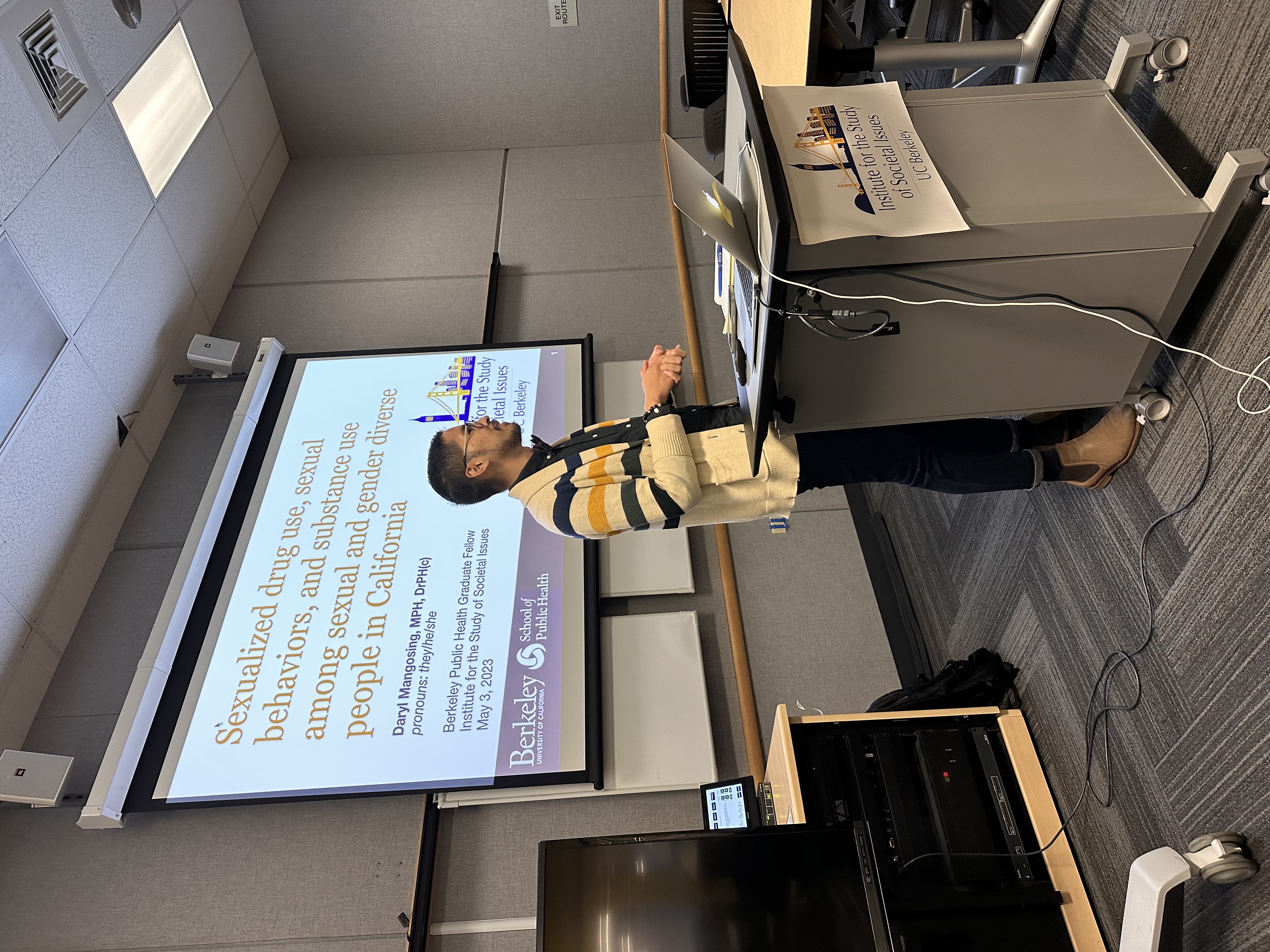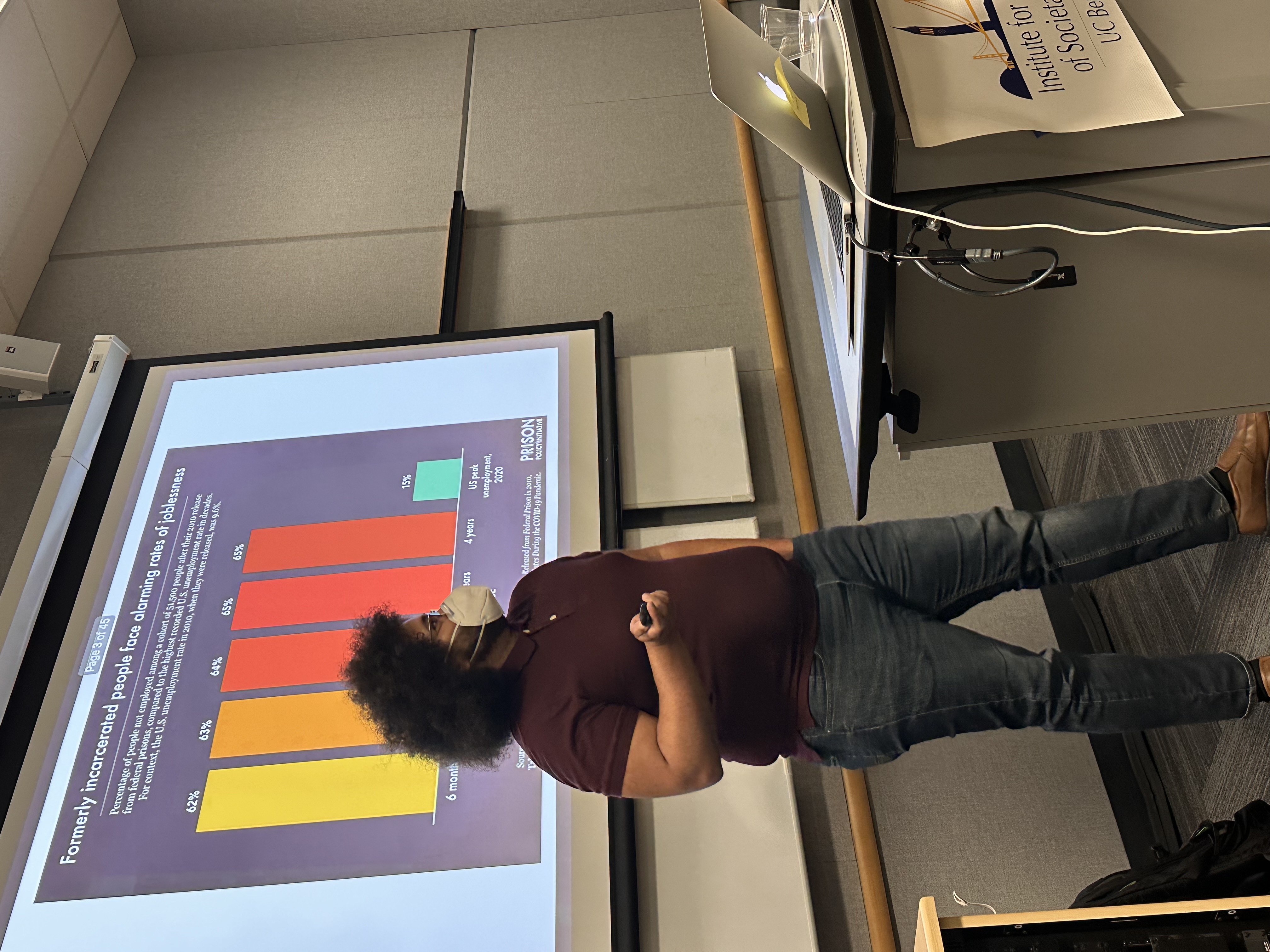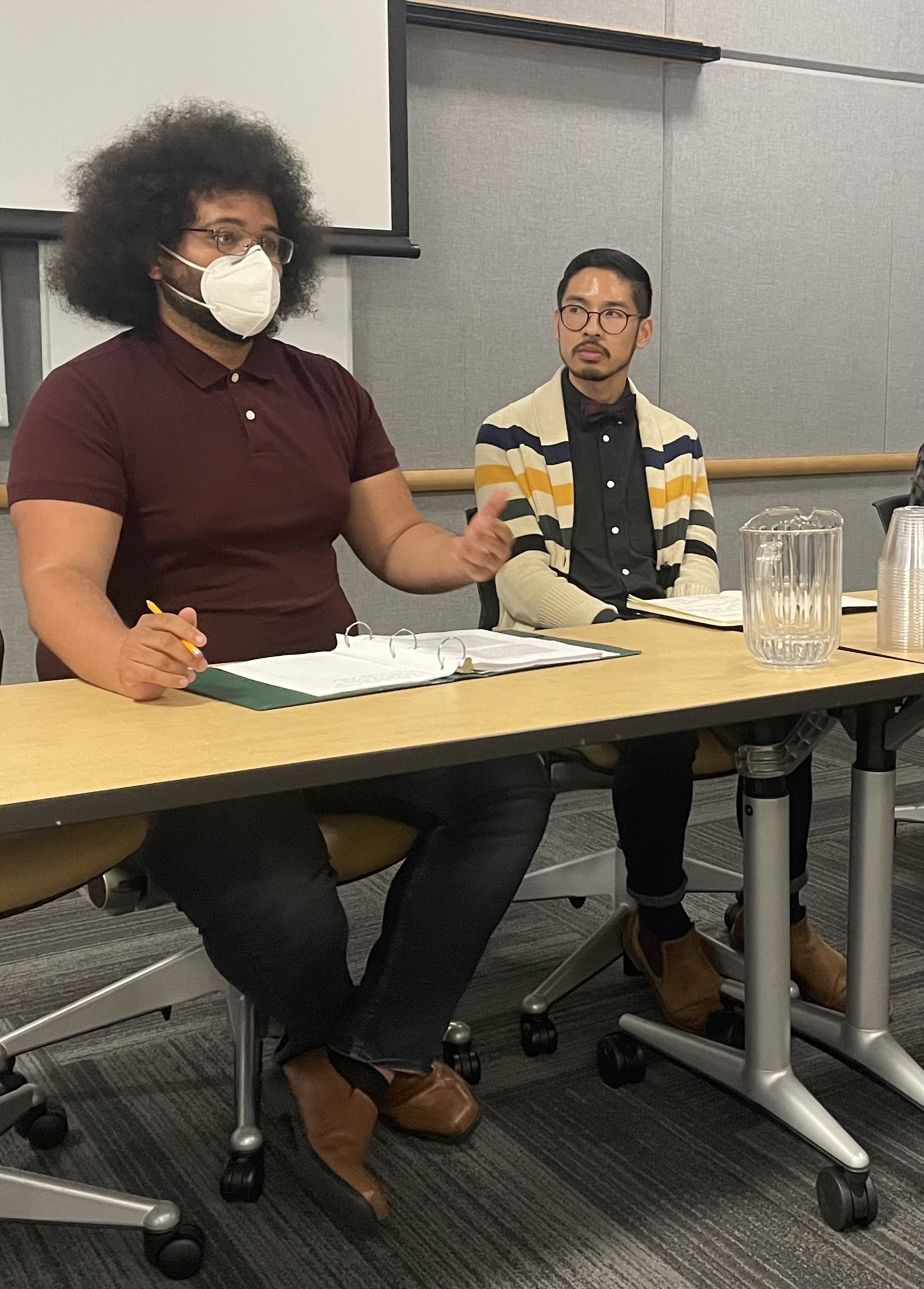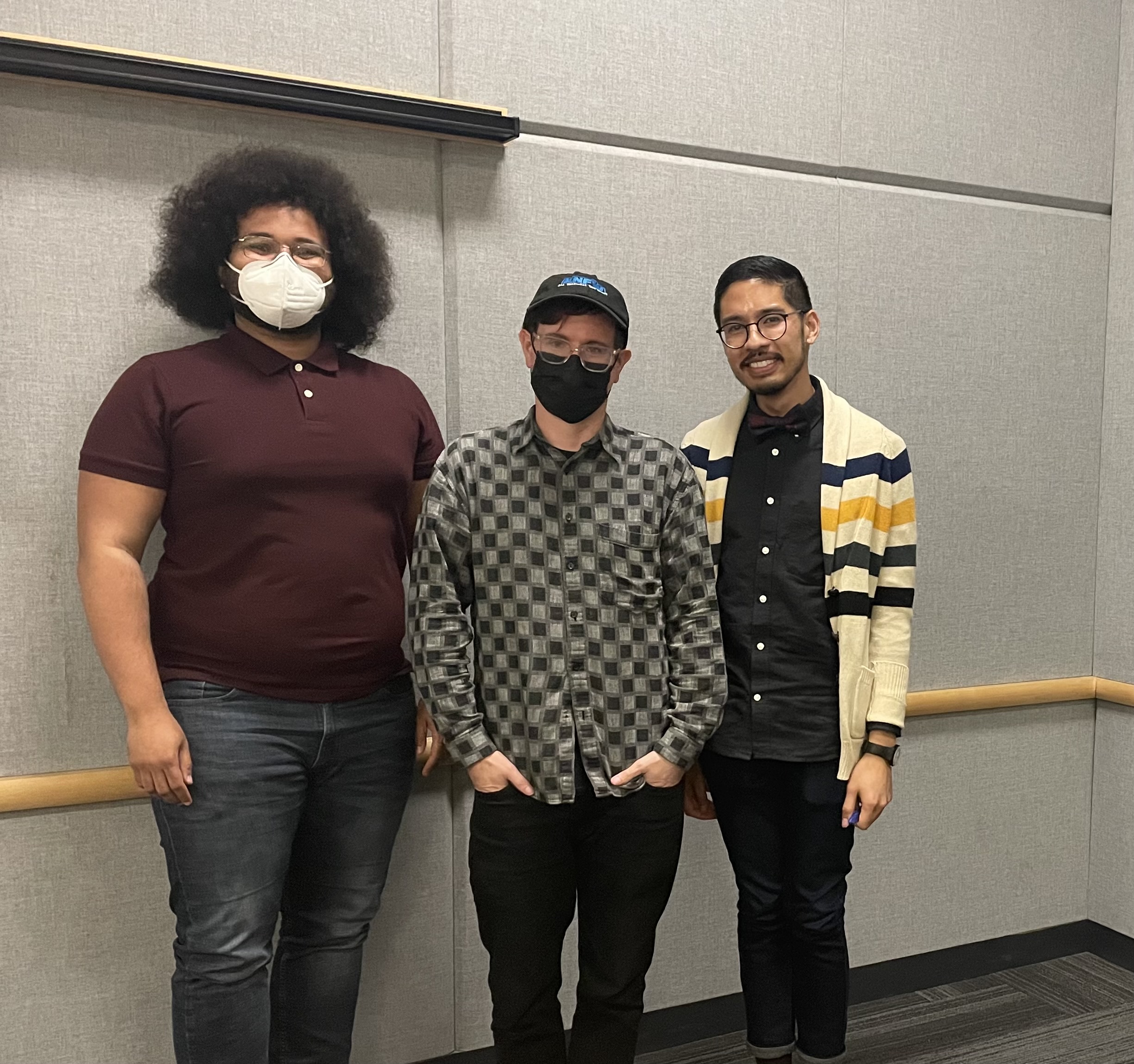What is the relevance of the academy to achieving social justice? What does it mean to be a social change scholar? How can the academy be (re-)made to reflect the diversity and complexity of society, where students and communities have active voices and roles in shaping the pedagogy, research approaches, and policy production of the research university? For more than four decades, ISSI's Graduate Fellows Program has provided mentorship, training and support to doctoral students engaged in social change scholarship.
This one-day symposium features the current first-year Graduate Fellows sharing their work in progress. Each panel includes one faculty respondent.
Wednesday, May 3, 2023, 9am-4pm
Academic Innovation Studio, 127 Dwinelle Hall (in-person only)
Program
(abstracts and respondent bios are below, and presenter bios are linked)
9-9:30: Coffee and pastries
9:30-11: Panel 1
Predicting Suicidal Ideation among Native American High Schoolers in California by Valentín Sierra, PhD Candidate, Berkeley Social Welfare
“Hell no, I am not prepared”: An Examination of Undocumented Students’ Post-Graduation Concerns by Martha Ortega Mendoza, PhD Candidate, Berkeley School of Education
Respondent: Genevieve Negrón-Gonzales, Professor of Leadership Studies, School of Education, University of San Francisco
11-11:30: Coffee and pastries
11:30-12: Help yourself to a plate of lunch to enjoy during the next session
12-2: Panel 2
“The Hug Shared Around the World”: Devonte Hart, Racial Iconicity, and the Affects of Repetition by Rashad Arman Timmons, PhD Candidate, African Diaspora Studies, UC Berkeley
The Wheels on the Bus Go across the Urban District: Convergent Interests and Educational Integration for Mandarin-English Dual Language Immersion Schooling by Catherine Park, PhD Candidate, Berkeley School of Education
Governing the Governable: The Political Economy of Street Vending in San Francisco by Irene Farah, PhD Candidate, City and Regional Planning, UC Berkeley
Respondent: Lok Siu, Professor of Ethnic Studies, UC Berkeley
2-2:30: Light refreshments
2:30-4: Panel 3
Sexualized Drug Use, Sexual Behaviors, and Substance Use Among Sexual and Gender Diverse People in California by Daryl Mangosing, DrPH Candidate, Berkeley Public Health
Carceral Networking and Precarious Labor: Prisonization, Capital, and a New Urban Policing in San Francisco by Xavier Durham, PhD Student, Sociology, UC Berkeley
Respondent: Eric A. Stanley, Associate Professor of Gender and Women's Studies, UC Berkeley
Sponsored by: Institute for the Study of Societal Issues
Co-sponsored by: Office of Graduate Diversity
ISSI gratefully acknowledges the financial support from the College of Letters and Sciences and from the Graduate Division, which makes it possible for us to give modest stipends to our Fellows. Your gift will enable us to increase these stipends.
Abstracts
Carceral Networking and Precarious Labor: Prisonization, Capital, and a New Urban Policing in San Francisco
Xavier Durham, PhD Student, Sociology, UC Berkeley
 Almost no one hires formerly-incarcerated people and those who do subject them to exploitative working conditions. Moreover, welfare services, housing opportunities, etc. are lacking, increasing recidivism risk. Indeed, punishment never ceases. But while these phenomena make reentry difficult, new findings challenge the ‘unassailable’ stigma of criminal records in the labor market.
Almost no one hires formerly-incarcerated people and those who do subject them to exploitative working conditions. Moreover, welfare services, housing opportunities, etc. are lacking, increasing recidivism risk. Indeed, punishment never ceases. But while these phenomena make reentry difficult, new findings challenge the ‘unassailable’ stigma of criminal records in the labor market.
In cities across the U.S., emerging non-governmental organizations not only hire formerly-incarcerated people but prioritize them as these applicants’ carceral experiences are rendered assets. One organization is Urban Alchemy (UA), a non-profit that provides security, sanitation services, and housing. Boasting a budget exceeding sixty million dollars, UA’s employee base is 96% formerly-incarcerated. However, UA’s collaboration with police proves challenging as most employees come from historically over-policed areas.
Drawing on 30 semi-structured interviews with UA employees working in San Francisco’s Tenderloin district, I make two arguments. First, carceral socialization has become a site of cultural and social capital, an emerging dynamic I call ‘carceral networking.’ Second, UA employees’ proximity to the penal state complicates their relationship to their work as it augments the policing practices that they themselves experience.
Governing the Governable: The Political Economy of Street Vending in San Francisco
Irene Farah, PhD Candidate, City and Regional Planning, UC Berkeley
 What forces govern street vending in San Francisco? In 2022, San Francisco passed a street vending ordinance to regulate vending in public space. The city government framed the urgency of creating the ordinance around the conspicuous vending of stolen goods and drugs happening outside the Mission District’s subway stations. However, the ordinance missed its target, implementing regulatory measures for street vendors who were not involved in selling stolen goods or drugs, but who were customary vendors from the neighborhood or started working on the street due to the COVID-19 crisis. Through a qualitative mixed-methods approach, this article examines the reactions of vendors, community organizations, and street-level bureaucrats (e.g., district supervisors, public works officials, and police officers) to the implementation of the street vending ordinance in San Francisco. The article finds that there is a spatial distinction between vendors that are willing to be regulated and others actively skirting the law. The article also finds under-resourced community organizations, a lack of collective action on behalf of vendors, and an important policy gap between organizations and the city. These findings are explained given that most vendors are undocumented migrants and thus cannot vote and exert pressure on elected officials. Therefore, the city is tolerating vendors that are a priori willing to be regulated but neglecting the enforcement on those who are avoiding the regulation.
What forces govern street vending in San Francisco? In 2022, San Francisco passed a street vending ordinance to regulate vending in public space. The city government framed the urgency of creating the ordinance around the conspicuous vending of stolen goods and drugs happening outside the Mission District’s subway stations. However, the ordinance missed its target, implementing regulatory measures for street vendors who were not involved in selling stolen goods or drugs, but who were customary vendors from the neighborhood or started working on the street due to the COVID-19 crisis. Through a qualitative mixed-methods approach, this article examines the reactions of vendors, community organizations, and street-level bureaucrats (e.g., district supervisors, public works officials, and police officers) to the implementation of the street vending ordinance in San Francisco. The article finds that there is a spatial distinction between vendors that are willing to be regulated and others actively skirting the law. The article also finds under-resourced community organizations, a lack of collective action on behalf of vendors, and an important policy gap between organizations and the city. These findings are explained given that most vendors are undocumented migrants and thus cannot vote and exert pressure on elected officials. Therefore, the city is tolerating vendors that are a priori willing to be regulated but neglecting the enforcement on those who are avoiding the regulation.
Sexualized Drug Use, Sexual Behaviors, and Substance Use Among Sexual and Gender Diverse People in California
Daryl Mangosing, DrPH Candidate, Berkeley Public Health
 Sexualized drug use (SDU), the use of drugs to facilitate sex, is a contributor to sexually transmitted infection (STI) diagnoses like HIV, predominantly among men who have sex with men. One type of SDU known as “chemsex” or “party and play” has been associated with sexual risk behaviors, negative health outcomes, and the nonsystematic use of condoms. However, such evidence has tended to rely on individual health outcomes, erasing the fuller context of lived experiences, desires, and social networks. This study reconceptualizes SDU as an assemblage of variable and context-specific practices and a site of pleasure and experimentation. It also investigates how sexual and gender diverse (SGD) people employ STI-prevention strategies within their sexual networks and how they navigate them with their partners. A purposive sample of adult SGD people residing in California who report having engaged in recent SDU were recruited through online dating applications/websites and snowball sampling techniques (n=18). In-depth interviews were conducted using a semi-structured interview guide. Interview transcripts were analyzed using a modified grounded theory approach. Findings inform more nuanced and tailored SDU interventions that not only address overall health and sexual wellbeing but also mitigate substance-related harms.
Sexualized drug use (SDU), the use of drugs to facilitate sex, is a contributor to sexually transmitted infection (STI) diagnoses like HIV, predominantly among men who have sex with men. One type of SDU known as “chemsex” or “party and play” has been associated with sexual risk behaviors, negative health outcomes, and the nonsystematic use of condoms. However, such evidence has tended to rely on individual health outcomes, erasing the fuller context of lived experiences, desires, and social networks. This study reconceptualizes SDU as an assemblage of variable and context-specific practices and a site of pleasure and experimentation. It also investigates how sexual and gender diverse (SGD) people employ STI-prevention strategies within their sexual networks and how they navigate them with their partners. A purposive sample of adult SGD people residing in California who report having engaged in recent SDU were recruited through online dating applications/websites and snowball sampling techniques (n=18). In-depth interviews were conducted using a semi-structured interview guide. Interview transcripts were analyzed using a modified grounded theory approach. Findings inform more nuanced and tailored SDU interventions that not only address overall health and sexual wellbeing but also mitigate substance-related harms.
“Hell no, I am not prepared”: An Examination of Undocumented Students’ Post-Graduation Concerns
Martha Ortega Mendoza, PhD Candidate, Berkeley School of Education
 The question motivating this study is as follows: What are undocumented undergraduate and graduate students’ concerns, if any, as they plan for life after graduation? To answer this question, this article draws from seventy-two anonymous online survey responses and five focus group interviews with a group of undocumented undergraduate and graduate students attending a top-tier four-year public university in California. Findings reveal that the students have two salient post-graduation concerns: (a) limited employment and career-related prospects; and, for the undergraduates, (b) limited graduate school opportunities. Together these two findings suggest that it is nearly impossible for undocumented students to disentangle their immigration-related concerns from the limited pathways available to them post-graduation. While higher education institutions cannot adjust students’ immigration status, this article calls on institutions to leverage students’ experiences and concerns to build infrastructures that can support undocumented students to better prepare for life after graduation. The article concludes with avenues for future research and institutional recommendations.
The question motivating this study is as follows: What are undocumented undergraduate and graduate students’ concerns, if any, as they plan for life after graduation? To answer this question, this article draws from seventy-two anonymous online survey responses and five focus group interviews with a group of undocumented undergraduate and graduate students attending a top-tier four-year public university in California. Findings reveal that the students have two salient post-graduation concerns: (a) limited employment and career-related prospects; and, for the undergraduates, (b) limited graduate school opportunities. Together these two findings suggest that it is nearly impossible for undocumented students to disentangle their immigration-related concerns from the limited pathways available to them post-graduation. While higher education institutions cannot adjust students’ immigration status, this article calls on institutions to leverage students’ experiences and concerns to build infrastructures that can support undocumented students to better prepare for life after graduation. The article concludes with avenues for future research and institutional recommendations.
The Wheels on the Bus Go across the Urban District: Convergent Interests and Educational Integration for Mandarin-English Dual Language Immersion Schooling
Catherine Park, PhD Candidate, Berkeley School of Education
 While dual language immersion (DLI) programs have proliferated in recent years, DLIs have been critiqued as moving away from their foundations in serving minoritized students and instead catering to the desires of mostly White, middle-class communities in an era of commodified multiculturalism and multilingualism. Rather than a wholesale critique of this shift in DLI priorities and its interactions with school choice policies, I trace the delicate mechanisms by which DLIs may attempt to meet the multifaceted needs of various stakeholders, including lower-income, minoritized students through converging interests of parents and school districts. Through a case study of a public Mandarin-English DLI school in an urban, segregated public school district in California, I follow how a DLI school is co-constructed into a more diverse and equitable school that highlights potentialities for schools as spaces for integration and mobility versus as spaces of gentrification and exclusion. Though this case provides a unique look into possibilities, I also highlight the limits of relying on individualized efforts of parents for sociospatial educational integration in the context of neoliberal educational politics.
While dual language immersion (DLI) programs have proliferated in recent years, DLIs have been critiqued as moving away from their foundations in serving minoritized students and instead catering to the desires of mostly White, middle-class communities in an era of commodified multiculturalism and multilingualism. Rather than a wholesale critique of this shift in DLI priorities and its interactions with school choice policies, I trace the delicate mechanisms by which DLIs may attempt to meet the multifaceted needs of various stakeholders, including lower-income, minoritized students through converging interests of parents and school districts. Through a case study of a public Mandarin-English DLI school in an urban, segregated public school district in California, I follow how a DLI school is co-constructed into a more diverse and equitable school that highlights potentialities for schools as spaces for integration and mobility versus as spaces of gentrification and exclusion. Though this case provides a unique look into possibilities, I also highlight the limits of relying on individualized efforts of parents for sociospatial educational integration in the context of neoliberal educational politics.
Predicting Suicidal Ideation among Native American High Schoolers in California
Valentín Sierra, PhD Candidate, Berkeley Social Welfare
 Suicide is the leading cause of non-accidental death for Native American young people ages 15-24 years old. Concerningly, suicide rates have continued to rise over the past decade despite the advancement of a myriad of prevention efforts. This shortcoming has urged some scholars to (re)examine key theoretical constructs to better direct suicide prevention efforts in tribal communities. Using Indigenous Wholistic Theory, an algorithmic approach was employed to identify multi-level factors that may influence suicidal ideation among Native American high schoolers in California (n = 2,609). Least absolute shrinkage and selection operator (lasso) penalized regression was used to select the optimal predictors of suicidal ideation. The model identified ten out of the 17 input predictors that were significant including: depressive symptoms; school-based victimization; sexual and gender minority status; lifetime use of alcohol, vapes, and cannabis; breakfast consumption; access to alcohol and other drugs; and parent education level. The study found that a combination of various multi-level factors across individual, emotional-social, mental-political, and physical-economic domains could be used to predict the individualized risk of experiencing suicidal ideation beyond a singular, psycho-centric conceptualization of suicide. The study highlights the need for a more comprehensive understanding of suicide-related behavior among Native American youth.
Suicide is the leading cause of non-accidental death for Native American young people ages 15-24 years old. Concerningly, suicide rates have continued to rise over the past decade despite the advancement of a myriad of prevention efforts. This shortcoming has urged some scholars to (re)examine key theoretical constructs to better direct suicide prevention efforts in tribal communities. Using Indigenous Wholistic Theory, an algorithmic approach was employed to identify multi-level factors that may influence suicidal ideation among Native American high schoolers in California (n = 2,609). Least absolute shrinkage and selection operator (lasso) penalized regression was used to select the optimal predictors of suicidal ideation. The model identified ten out of the 17 input predictors that were significant including: depressive symptoms; school-based victimization; sexual and gender minority status; lifetime use of alcohol, vapes, and cannabis; breakfast consumption; access to alcohol and other drugs; and parent education level. The study found that a combination of various multi-level factors across individual, emotional-social, mental-political, and physical-economic domains could be used to predict the individualized risk of experiencing suicidal ideation beyond a singular, psycho-centric conceptualization of suicide. The study highlights the need for a more comprehensive understanding of suicide-related behavior among Native American youth.
“The Hug Shared Around the World”: Devonte Hart, Racial Iconicity, and the Affects of Repetition
Rashad Arman Timmons, PhD Candidate, African Diaspora Studies, UC Berkeley
 On November 25, 2014, a protest against police brutality occurred in Portland, Oregon. Activists organized the event to disavow the controversial non-indictment of Ferguson officer Darren Wilson in the shooting death of Michael Brown, Jr. During the demonstration, a white police sergeant named Bret Barnum and a 12-year-old black boy named Devonte Hart shared a hug. The act, captured by freelance photographer Johnny Nguyen, became a racially iconic moment of the rally and was hailed as a symbol of reconciliation in a nation mired in civil unrest. The photograph circulated widely across broadcast and digital media, leading The Oregonian to name the image “the hug shared around the world.”
On November 25, 2014, a protest against police brutality occurred in Portland, Oregon. Activists organized the event to disavow the controversial non-indictment of Ferguson officer Darren Wilson in the shooting death of Michael Brown, Jr. During the demonstration, a white police sergeant named Bret Barnum and a 12-year-old black boy named Devonte Hart shared a hug. The act, captured by freelance photographer Johnny Nguyen, became a racially iconic moment of the rally and was hailed as a symbol of reconciliation in a nation mired in civil unrest. The photograph circulated widely across broadcast and digital media, leading The Oregonian to name the image “the hug shared around the world.”
Using visual and discourse analyses of the photograph, news articles, and social media posts, I interrogate the affective economies that facilitated (1) the image’s rapid circulation in late 2014 following the non-indictment of Darren Wilson; (2) its relative disappearance in 2018 after adoptive parents Sarah and Jennifer Hart murdered Devonte and his siblings; and (3) its reappearance in social media discourse during the racial uprisings in summer of 2020. I argue that the photograph recurs over time, even after Devonte’s tragic death, because it projects the possibility of a national future where black radicalism is subdued and normative social order is restored.
Respondent Bios
 Genevieve Negrón-Gonzales is Professor of Leadership Studies in the School of Education at the University of San Francisco. Her academic, activist and community work focuses on the ways undocumented young people are changing the political and legislative terrain around “illegality” and belonging in this country. Her work lies at the intersection of education, immigration, and social movements. She is the co-author of Encountering Poverty: Thinking and Acting in an Unequal World (University of California Press, 2016) and of The Latinx Guide to Graduate School (Duke University Press, 2023) and co-editor of We Are Not DREAMers: Undocumented Scholars Theorize Undocumented Life in the United States (Duke University Press, 2020).
Genevieve Negrón-Gonzales is Professor of Leadership Studies in the School of Education at the University of San Francisco. Her academic, activist and community work focuses on the ways undocumented young people are changing the political and legislative terrain around “illegality” and belonging in this country. Her work lies at the intersection of education, immigration, and social movements. She is the co-author of Encountering Poverty: Thinking and Acting in an Unequal World (University of California Press, 2016) and of The Latinx Guide to Graduate School (Duke University Press, 2023) and co-editor of We Are Not DREAMers: Undocumented Scholars Theorize Undocumented Life in the United States (Duke University Press, 2020).
 Eric A. Stanley is the Haas Distinguished Chair in LGBT Equity and an associate professor in the Department of Gender and Women’s Studies at the University of California, Berkeley. They are the author of Atmospheres of Violence: Structuring Antagonism and the Trans/Queer Ungovernable (Duke University Press, 2021) and co-editor of Trap Door: Trans Cultural Production and the Politics of Visibility (MIT Press, 2017) and of Captive Genders: Trans Embodiment and the Prison Industrial Complex (AK Press 2011/15). In collaboration with Chris Vargas, Professor Stanley directed the films Criminal Queers (2019) and Homotopia (2008).
Eric A. Stanley is the Haas Distinguished Chair in LGBT Equity and an associate professor in the Department of Gender and Women’s Studies at the University of California, Berkeley. They are the author of Atmospheres of Violence: Structuring Antagonism and the Trans/Queer Ungovernable (Duke University Press, 2021) and co-editor of Trap Door: Trans Cultural Production and the Politics of Visibility (MIT Press, 2017) and of Captive Genders: Trans Embodiment and the Prison Industrial Complex (AK Press 2011/15). In collaboration with Chris Vargas, Professor Stanley directed the films Criminal Queers (2019) and Homotopia (2008).

Lok Siu is Professor of Ethnic Studies and Chair of the Asian American Research Center at the University of California, Berkeley. She specializes in migration, Asian diasporas, belonging/citizenship, the cultural politics of food, and ethnography. She is the author of Memories of a Future Home: Diasporic Citizenship of Chinese in Panama (Stanford U Press 2005) and co-editor of Asian Diasporas: New Formations, New Conceptions (Stanford U Press 2007), Gendered Citizenships: Transnational Perspectives on Knowledge Production, Political Activism, and Culture (Palgrave 2009), and Chinese Diaspora: Its Development in Global Perspective (Zoryan Institute 2020).


